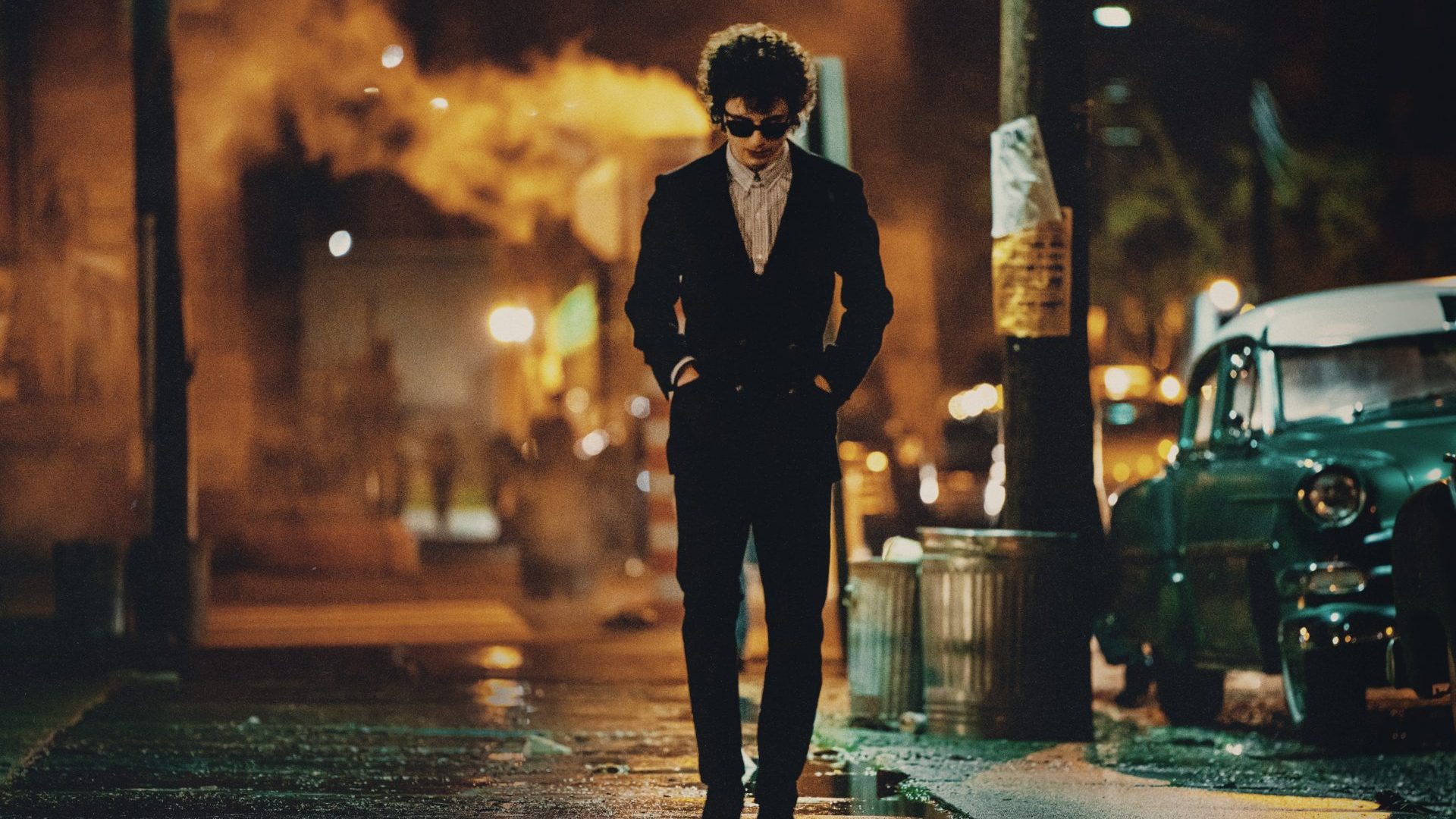A Complete Unknown (general release)
It takes a special kind of audacity – or foolhardiness – to make a conventional biopic about Bob Dylan. There have been the documentaries of D A Pennebaker and Martin Scorsese; Dylan’s own genre-mixing Renaldo and Clara (1978); and Todd Haynes’s experimental I’m Not There (2007), in which six actors (including Cate Blanchett, Richard Gere and Heath Ledger) explored different facets of the minstrel’s famously protean personality. But James Mangold dares to take a more traditional approach and tell the tale of Dylan’s arrival in New York in January 1961, rise to stardom and legendary electric set at the Newport Folk Festival in July 1965.
Though Dylan himself has given his blessing to the movie, which is based on Elijah Wald’s Dylan Goes Electric! (2015), and specifically to Timothée Chalamet, outstanding in the lead role, the film has already infuriated hardcore Dylanologists with the artistic liberties it takes.
So yes: it is true that the aspiring singer-songwriter did not meet his hero Woody Guthrie (Scoot McNairy) and future mentor Pete Seeger (Edward Norton, outstanding) at Greystone Park Psychiatric Hospital in New Jersey. He was not alone when he got to New York but with his friend Fred Underhill, who has been air-brushed from the story. He is shown on stage with Joan Baez (Monica Barbaro, also superb) singing Girl From the North Country, a performance of which no recording exists. Mangold’s account of what Dylan calls “the fiasco at Newport” is disputed and undoubtedly incorporates material from a separate concert at the Free Trade Hall in Manchester the following year.
But it is ridiculously puritanical to dismiss the movie on this basis. Indeed, one of its central themes is the speed with which the emancipating power of an audience’s love for an artist can congeal into a heresy-hunting cult. As the late Irish singer Liam Clancy observes in Scorsese’s No Direction Home (2005): “It wasn’t necessary for him to be a definitive person”. And Chalamet brilliantly communicates Dylan’s bristling refusal to be categorised or confined – an innate restlessness that also helped to wreck his relationship with Suze Rotolo (who appears on the cover of The Freewheelin’ Bob Dylan), here renamed Sylvie Russo (Elle Fanning).
“You got kids?” a street vendor asks Dylan, selling him a whistle. “Thousands of them,” is the laconic reply from the singer as he lopes off, hunched as if already bearing a colossal weight. Now, as a hard rain falls once more, a new generation of moviegoers will get to see how the 83-year-old Nobel Prize winner – still touring after all this time – burst upon the scene and changed everything more than 60 years ago.
Today’s self-styled “disruptors” are wall-eyed plutocrats like Elon Musk and Mark Zuckerberg. This was, and remains, the real deal.
Elektra (Theatre Royal Brighton, until January 18; Duke of York’s Theatre, London, January 24-April 12)
Almost two and a half millennia since its composition, Sophocles’ tragic portrayal of Agamemnon’s daughter, consumed by grief and vengefulness, still speaks to timeless human passions.
With Oscar-winner Brie Larson in the lead and Stockard Channing as her mother Clytemnestra, Daniel Fish’s production has formidable star power. But the whole cast is excellent – especially Marième Diouf as Elektra’s sister, Chrysothemis, urging her to compromise, and Patrick Vaill as her brother Orestes. Crop-haired in a ‘Bikini Kill’ t-shirt, Larson is a riveting presence, unbending in her determination to take revenge on her mother and her lover Aegisthus (Greg Hicks) for murdering her father.
As the play’s translator Anne Carson has written, she is “a torrent of self” – unimpressed by her mother’s insistence that Agamemnon deserved to die, having sacrificed their daughter Iphigenia on his way to the Trojan War. “I am the shape you made me,” says Elektra. “Filth teaches filth”.
Fish grasps that myth is best delivered in primal, simple form, and his staging is accordingly minimal – with a rotating centre around which the chorus squats and frequent use of sound distortion compounding the sense of unease and menace. The dialogue is punctuated by eerie noises and interwoven recordings – including Beyoncé’s Daddy Lessons (“Daddy made a soldier out of me”). Compressed, claustrophobic and seething with emotion, this is a memorable rendering of an ancient play.
American Primeval (Netflix)
No surprise, really, that American culture is presently fixated upon the nation’s rough origins, the age of the frontier, the lawlessness of land hunger. The glossy variant of this preoccupation is Taylor Sheridan’s Yellowstone and its spin-off shows. Mark L Smith’s American Primeval, on the other hand, portrays a world of unrelenting violence, tribal and religious conflict, and hand-to-mouth survival.
As in The Revenant (2015), which Smith co-wrote, this is America as a Hobbesian state of nature. It is 1857, and the Mormon Militia, US army, and indigenous Americans vie for control of the Utah Territory. Sara Rowell (Betty Gilipin) and her son Devin (Preston Mota) arrive at Fort Bridger, founded by John Bridger (Shea Whigham), seeking safe passage to Crook Springs.
This is no easy ask. The governor of the territory, Brigham Young (Kim Coates), seeks to make the entire continent “Zion” for his fellow Mormons, and, to that theocratic end, ruthlessly deploys his private army, the Nauvoo Legion, headed by James Wolsey (Joe Tippett).
Meanwhile, the Wolf Clan, a renegade group of the Shoshone people, led by the warrior Red Feather (Derek Hinkey), accepts no compromise with the white colonisers and takes revenge wherever it can. Eventually, Sara finds a guide and protector in Isaac Reed (Taylor Kitsch), who was raised by the Shoshone – which is not to say that any of their travelling party is safe.
American Primeval is not for the faint-hearted: think Cormac McCarthy’s Blood Meridian (1985) souped up with the ultraviolent aesthetic of today’s video games. But it is never less than compelling.
The Crow Girl (Paramount+)
Remember the high season of Scandi Noir? Chic knitwear, terse dialogue, dour cityscapes: The Killing, The Bridge, Trapped, Bordertown.
Though set around Bristol, this absorbing six-part detective drama is adapted by Milly Thomas from a trilogy of books by the Swedish duo Jerker Eriksson and Håkan Axlander Sundquist who use the pen-name “Erik Axl Sund”. Light on cable knit jumpers, The Crow Girl nonetheless transports the genre’s trademark sense of foreboding, lurking evil and terse language successfully from Scandinavia to the West Country.
As a series of corpses of young men is discovered, DCI Jeanette Kilburn (Eve Myles, terrific) seeks the help of psychotherapist Sophie Craven (Katherine Kelly) – who has her own problems with a patient suffering from schizophrenia and another even darker case from her past.
Is Kilburn’s old-school sidekick and family friend, DI Lou Stanley (Dougray Scott), to be trusted? And is there a connection between the murders and illegal cage fights in which young asylum seekers are pitted against one another? Gripping, twisty, wintry viewing, with a second season already in the works.
Catching the Big Fish: Meditation, Consciousness, and Creativity, by David Lynch (Tarcher)
If you are looking for a way of remembering the great director (other than re-watching his movies), do try this wonderful collection of essays and reflections, first published in 2006 and still readily available online. The binding thesis is that meditation expands consciousness which helps the artist catch the “big fish” of great ideas: the “happy accidents” of creativity.
But the book is also a luminous treasury of memories: Lynch taking a job delivering the Wall Street Journal so he can complete Eraserhead (1977); the role played by chance in creating the terrifying image of Laura Palmer’s killer in Twin Peaks (1990-2017); the birth in meditation of Mulholland Drive (2001); and Lynch’s conclusion, almost 20 years ago, that “film is dead” and that the future is digital video. Gems from the mind of a unique auteur. RIP.




